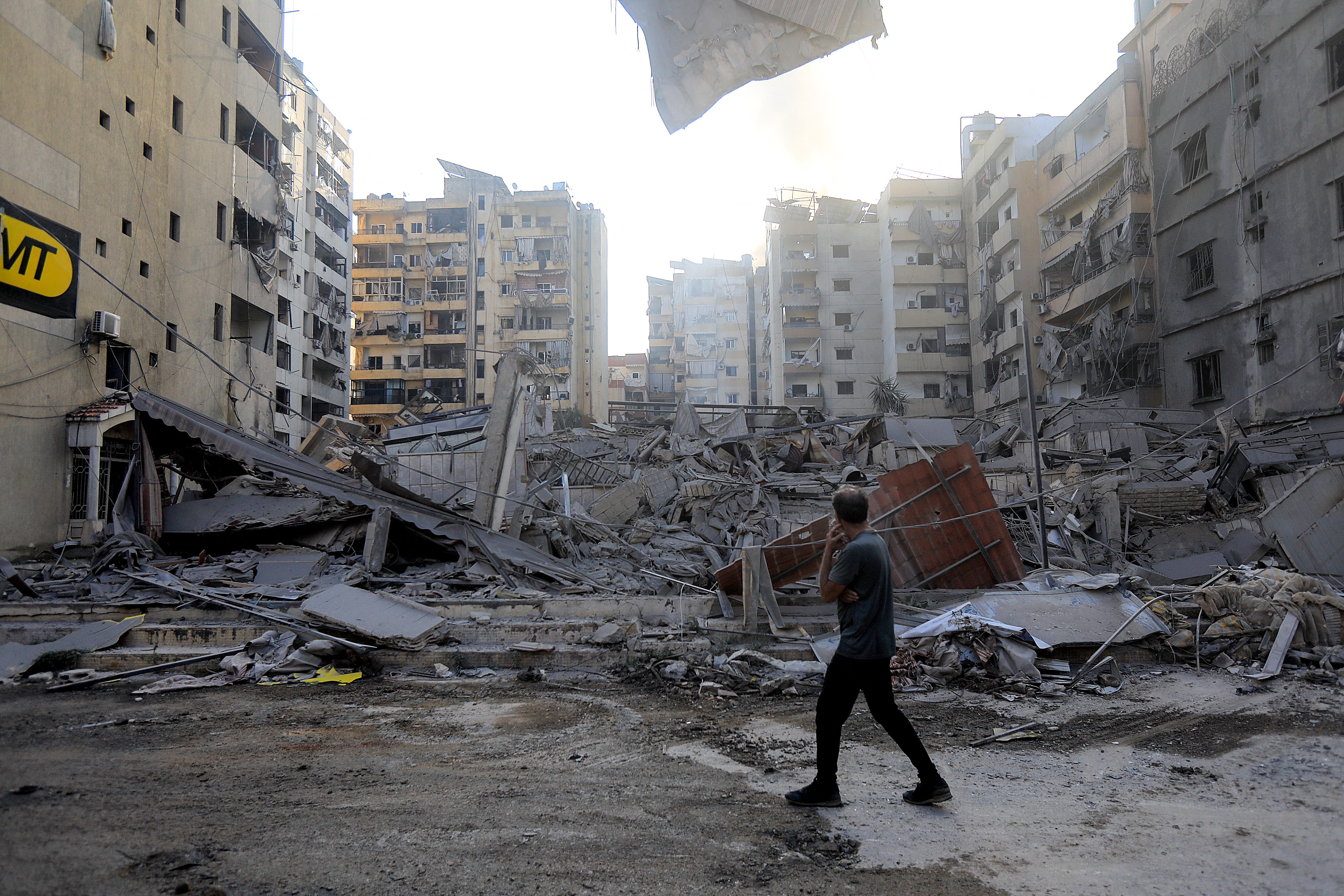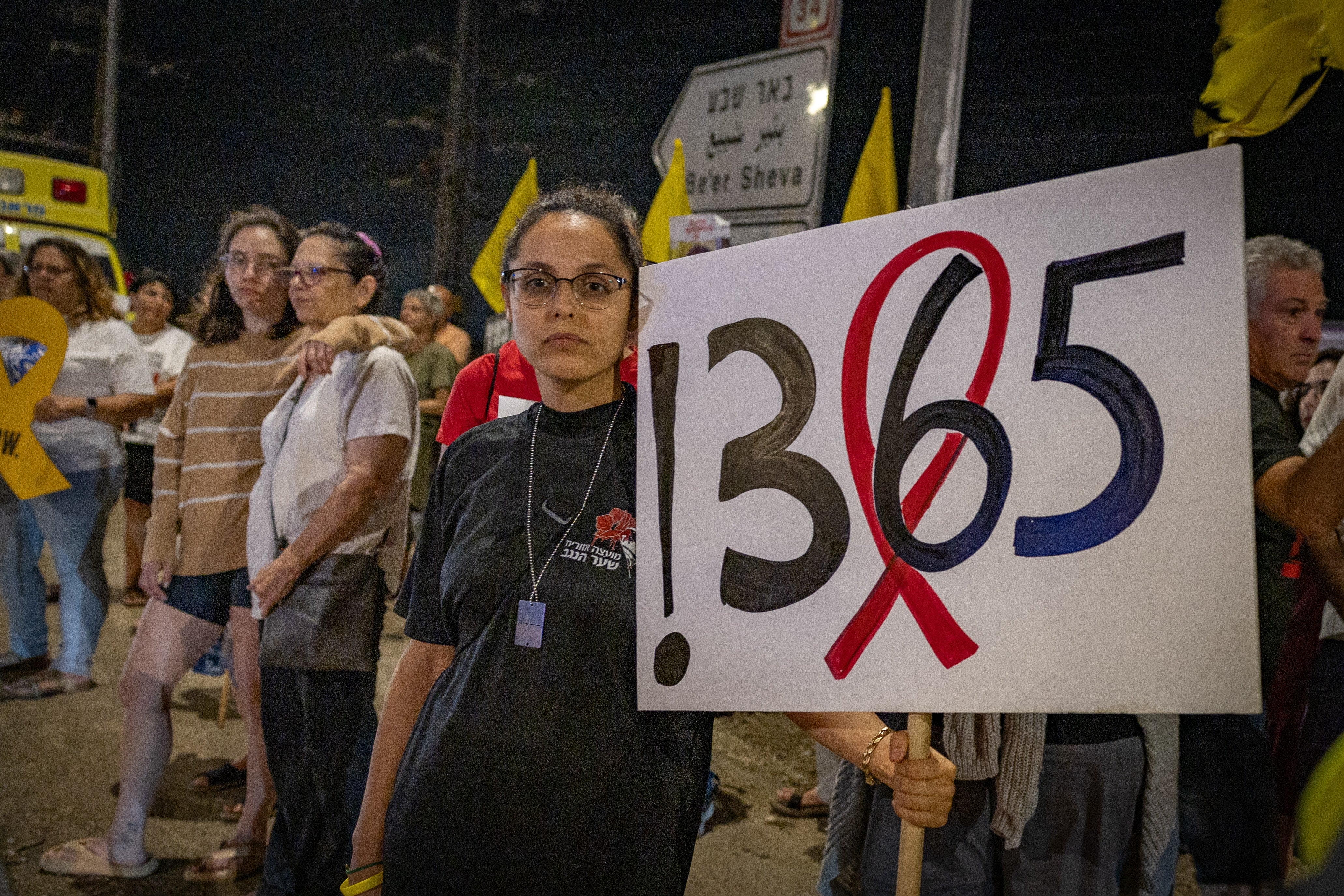Israel launched its most intense bombardment of south Beirut yet and a new offensive into northern Gaza as the region braced for the anniversary of the 7 October attacks.
Towering flames lit up the skies above the Lebanese capital overnight as Israeli warplanes pounded the southern suburbs of Dahiyeh, striking what the military said were Hezbollah positions.
In Gaza, Israeli strikes on a mosque and school housing displaced people in the central town of Deir al-Balah killed 23 people, according to the Palestinian health authorities.
The Israeli military separately issued evacuation orders for tens of thousands of people currently in Jabalia, north of Gaza City, which it said is set to become the focus of a new offensive.
Israeli officials, meanwhile, said they are preparing a “serious and significant” response to last week’s unprecedented ballistic missile attack from Iran.
The escalation has heightened concerns for the region and dashed hopes of a ceasefire, as civilians brace for the anniversary of the 7 October attacks by Hamas militants on southern Israel, a trigger for the increasingly complicated and widening multi-country conflict.
On the eve of the anniversary, with the Middle East in flames, US Vice President Kamala Harris said Washington will continue to pressure Israel and other players in the Middle East to reach a truce in Gaza.
“We’re not going to stop in terms of putting that pressure on Israel and the region, including Arab leaders,” Harris told CBS’s 60 Minutes. She added that diplomatic work with Israel is “an ongoing pursuit.”
President Joe Biden laid out a three-phase ceasefire plan for Gaza on May 31, but a deal collapsed over disagreements over the exchange of Israeli hostages and Palestinian prisoners, as well as Israel’s demand to maintain a presence in the so-called Philadelphi corridor on the southern edge of the Gaza Strip, bordering Egypt.
Washington has faced accusations of not using its leverage over Israel by refusing to impose an arms embargo. Protests were held over the weekend in the US and the UK.
The bloodshed has deepened fault lines in the Middle East, increasingly pitting Israel and its allies, including the US, against Iran and its proxies in Gaza, Lebanon, Syria, and Yemen.
This round of a decades-old conflict was triggered on 7 October 2023, when Hamas militants attacked Israel, killing 1,200 and taking about 250 hostages, according to Israeli tallies.
Israel’s subsequent punishing assault on the enclave has killed almost 42,000 Palestinians, according to the local health ministry, while displacing nearly the entire population of 2.3 million, pushing areas into famine, and leading to genocide allegations at the International Court of Justice, which Israel has repeatedly denied.
In tandem, Israel has been locked in an escalating conflict with Lebanon. Fighting which had previously been limited to cross-border exchanges of fire, escalated as Israel launched more strikes on the capital and a ground incursion in the south.
This has killed hundreds, wounded thousands and displaced over a million people, around a fifth of Lebanon’s population. Israel says around 50 of its civilians and soldiers have been killed.
Speaking from Beirut on Sunday, the head of the United Nations Refugee Agency, Filippo Grandi, implored all parties to the conflict and those with influence over them should “stop the carnage happening both in Gaza and in Lebanon today”.

Israel denies accusations of indiscriminate strikes, maintaining that its operations in Lebanon are “precise” and “focused” on Hezbollah capabilities, and that it takes steps to mitigate the risk to civilians.
But Mr Grandi warned that Israeli strikes in Lebanon had “violated international law, damaged civilian infrastructure, killed civilians, and impacted humanitarian operations.”
He added the World Health Organization had briefed him “about egregious violations of international humanitarian law, particularly concerning health facilities impacted in various locations in Lebanon.”
In Gaza on Saturday, Palestinian health officials said that an Israeli airstrike hit a mosque and school in Deir al-Balah, where people had been sheltering, killing 23 people in total.
The Israeli military later ordered an evacuation of Jabalia, a neighbourhood north of Gaza City, that has been heavily bombed in recent days.
Military spokesperson Lt. Col. Nadav Shoshani said the military was “focusing at the moment on northern Jabalia because intelligence indicated Hamas forces were regrouping there.”
He added that “tens of thousands” of people in the area would be affected by the orders.
Shoshani also noted that “Hamas had dozens of thousands of rockets, and Hezbollah has somewhere around 150,000 rockets,” adding that while the number of Hamas rockets had dropped significantly, “there’s still a way to go”.

In Israel, families of the 100 or so hostages still believed to be in Gaza held rallies near the border with the besieged enclave, demanding that the Israeli government immediately sign a ceasefire-hostage exchange deal to bring their loved ones back.
Kobi Ben Ami, 54, whose brother Ohad, 55, is a hostage, said the family was “stuck in the 7 October 2023” until their loved ones are brought home.
“The facts speak for themselves. The bottom line is it has been a year, and they are still not home. The government is responsible.” he told The Independent.
In Gaza, civilians said some food prices had soared tenfold, and water was scarce.
Medics reported that supplies were running out and that there was nowhere left for them to escape to.“I have no home, no shelter, and little family left,” said Ziad Abdul-Dayem, an ambulance driver who lose 11 members of his family.
“All I wish for is for this war and this tragedy to end. What we have lived through is enough. We pray to God that all this will end and that we will return to our homes”.

